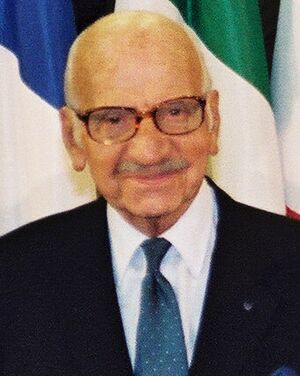Xenophon Zolotas facts for kids
Quick facts for kids
Xenophon Zolotas
|
|
|---|---|
| Ξενοφών Ζολώτας | |

Zolotas in 1989
|
|
| Prime Minister of Greece | |
| In office 23 November 1989 – 11 April 1990 |
|
| President | Christos Sartzetakis |
| Preceded by | Ioannis Grivas |
| Succeeded by | Konstantinos Mitsotakis |
| Governor of the Bank of Greece | |
| In office 27 November 1974 – 29 October 1981 |
|
| Preceded by | Panagotis Papaligouras |
| Succeeded by | Gerasimos Arsenis |
| In office 5 February 1955 – 5 August 1967 |
|
| Preceded by | Georgios Mantzavinos |
| Succeeded by | Dimitrios N. Galanis |
| In office 12 October 1944 – 8 January 1945 |
|
| Preceded by | Theodoros Tourkovasilis |
| Succeeded by | Kyriakos Varvaresos |
| Personal details | |
| Born |
Xenophon Euthymiou Zolotas
26 April 1904 Athens, Greece |
| Died | 10 June 2004 (aged 100) Athens, Greece |
| Political party | Independent |
| Spouse | Lola Zolotas (1923–2016) |
| Alma mater | University of Athens Leipzig University University of Paris |
Xenophon Euthymiou Zolotas (Greek: Ξενοφών Ζολώτας; 1904–2004) was a famous Greek economist. He also served as an interim Prime Minister of Greece for a short time. He was known for his deep knowledge of how countries manage their money.
Contents
Life and Career of Xenophon Zolotas
Xenophon Zolotas was born in Athens, Greece, in 1904. His father was a well-known jeweler. Xenophon first studied law at the University of Athens. He then went on to study economics in Germany and French literature in Paris.
Becoming a Professor and Bank Governor
By 1930, Zolotas became a professor at the University of Athens. He taught about economics, which is the study of how money, goods, and services are produced and used. In 1955, he took on a very important role. He became the Governor of the Bank of Greece. This bank is in charge of Greece's money system.
He held this position for many years, until 1981. There was a period from 1967 to 1974 when he resigned during a time of political change in Greece. He later returned to his role.
International Work and Prime Minister Role
Xenophon Zolotas also worked with important international groups. These included the International Monetary Fund, which helps countries with their money problems. He was known for believing in careful spending and keeping money stable.
In 1989, Greece had an election where no single party won enough votes to form a government. At 85 years old, Zolotas was asked to become the interim Prime Minister. This meant he would lead the country temporarily until a new election could be held. He served from November 1989 to April 1990.
His Unique Speeches
Zolotas was famous for giving speeches in English that mostly used words with Greek origins. He did this to show how many English words come from ancient Greek. These speeches were given at meetings of the International Bank for Reconstruction and Development.
He was a very hardworking person. Even when he was in his nineties, he made sure to swim every morning. He passed away in 2004 at the age of 100.
Images for kids
See also
 In Spanish: Xenofón Zolótas para niños
In Spanish: Xenofón Zolótas para niños
 | Laphonza Butler |
 | Daisy Bates |
 | Elizabeth Piper Ensley |


